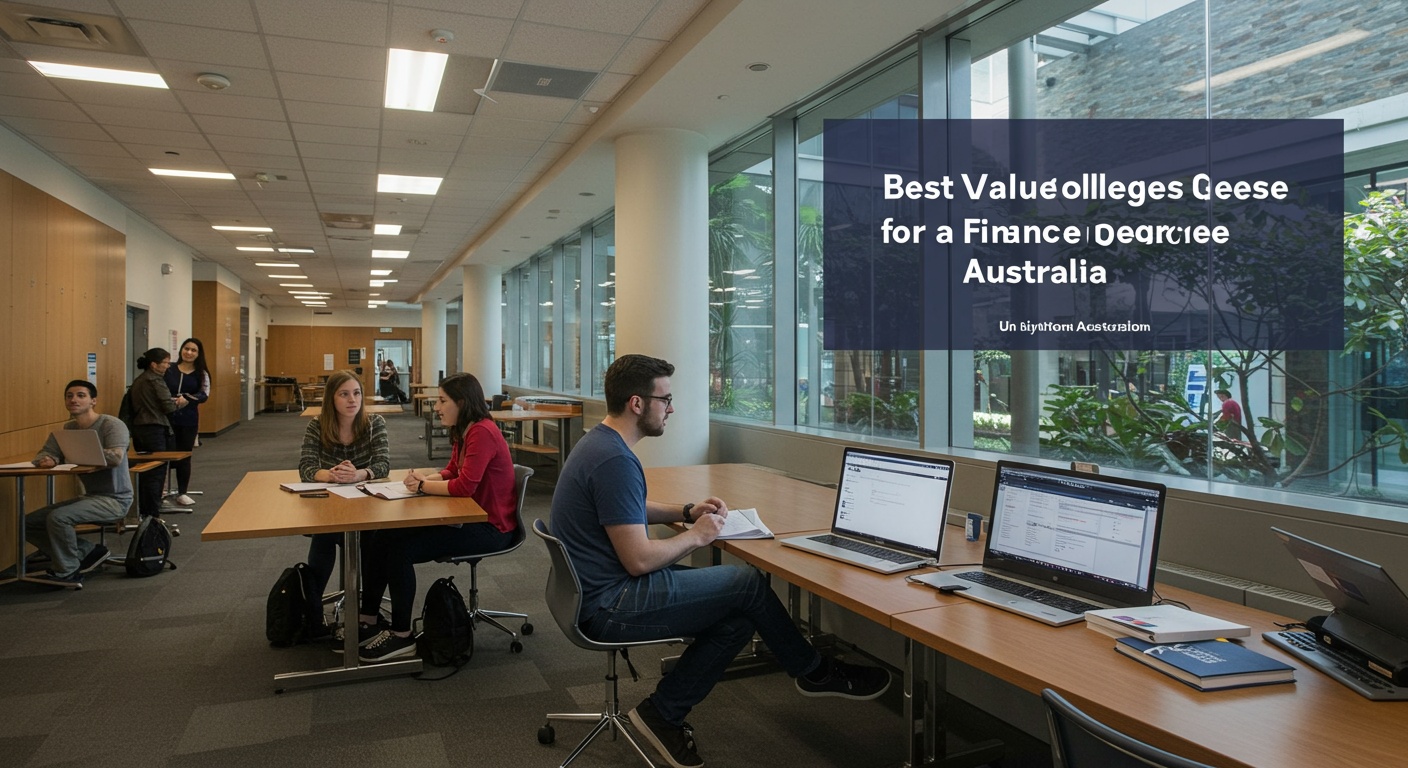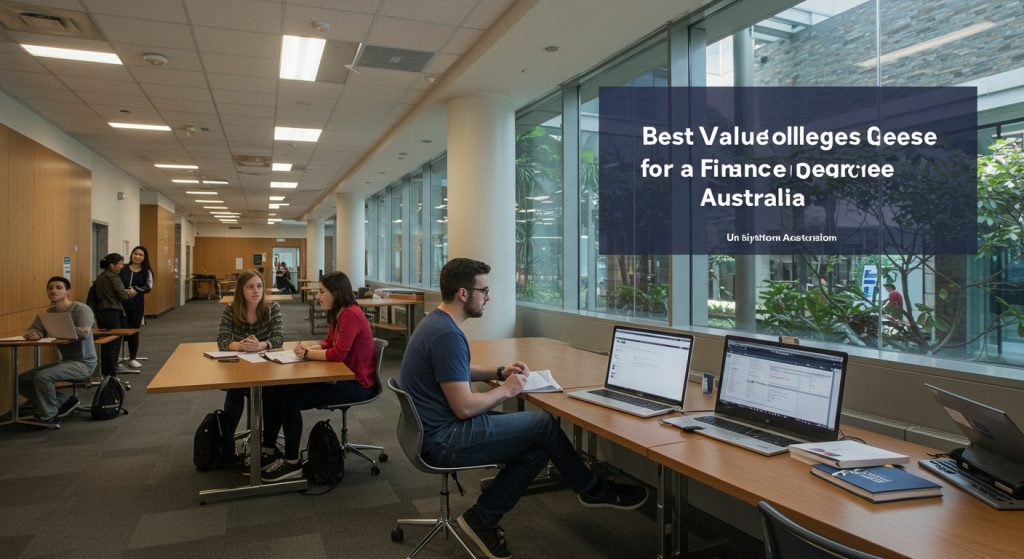Dreaming of conquering the Australian finance world without breaking the bank? Australia’s booming fintech sector, projected to reach \$3 billion by 2026, demands skilled graduates. Hefty tuition fees can deter aspiring finance professionals. Identifying institutions that deliver high-quality finance education at a reasonable cost requires careful consideration. We’ll navigate the landscape of Australian universities, spotlighting programs that balance academic rigor with affordability. We will evaluate factors like graduate employment rates, industry connections. Program accreditation, comparing institutions based on tuition fees, scholarship availability. Cost of living. Prepare to discover the best pathways to a rewarding finance career without accumulating crippling debt.

Understanding “Value” in Higher Education
When we talk about “value” in the context of a finance degree, it’s more than just the tuition fee. It’s a holistic consideration encompassing several factors:
- Tuition Fees: The upfront cost of the program.
- Scholarships and Financial Aid: Availability and accessibility of financial assistance.
- Location and Living Costs: Expenses associated with living near the university.
- Graduate Employment Rates: The percentage of graduates securing jobs in their field shortly after graduation.
- Starting Salary: The average salary earned by graduates in their first job.
- Reputation and Rankings: The university’s standing within Australia and internationally.
- Networking Opportunities: The strength of industry connections and alumni network.
- Curriculum and Faculty: The quality and relevance of the curriculum and the expertise of the teaching staff.
A “best value” college, therefore, isn’t necessarily the cheapest. It’s the one that provides the best return on investment, considering all these elements.
Decoding Finance Degrees: What to Expect
Before diving into specific universities, let’s clarify what a finance degree typically entails. A Bachelor of Finance (BFin) or Bachelor of Commerce (BCom) with a major in Finance will equip you with:
- Core Financial Principles: Understanding of financial markets, investment analysis, corporate finance. Risk management.
- Quantitative Skills: Proficiency in statistical analysis, econometrics. Financial modeling.
- Analytical Thinking: Ability to interpret financial data, identify trends. Make informed decisions.
- Communication Skills: Effectively conveying financial insights to diverse audiences.
- Ethical Considerations: Adherence to ethical standards in financial practice.
The curriculum usually covers subjects like:
- Financial Accounting
- Corporate Finance
- Investment Management
- Financial Modeling
- Derivatives
- International Finance
- Financial Planning
- Econometrics
Many programs also offer opportunities for internships, industry projects. Study abroad programs, which can significantly enhance your career prospects.
Key Metrics for Evaluating Finance Programs
When researching finance programs, consider these key metrics:
- Accreditation: Look for programs accredited by reputable bodies like the CFA Institute (Chartered Financial Analyst). This signifies a rigorous curriculum aligned with industry standards.
- Faculty Qualifications: Research the faculty’s credentials and experience. Are they active researchers? Do they have industry experience?
- Industry Connections: Does the university have strong relationships with financial institutions, investment firms. Corporations?
- Career Services: What kind of career support is offered to students, such as resume workshops, mock interviews. Job placement assistance?
- Student-to-Faculty Ratio: A lower ratio can mean more personalized attention and better learning outcomes.
- Research Opportunities: Are there opportunities for undergraduate students to participate in research projects?
Analyzing University Costs: Beyond Tuition Fees
Tuition fees are just one piece of the puzzle. Consider these additional costs:
- Accommodation: On-campus vs. Off-campus living. Costs vary significantly between cities and even suburbs.
- Textbooks and Materials: Finance textbooks can be expensive. Explore options like renting or buying used books.
- Transportation: Commuting costs, especially if you live far from campus.
- Living Expenses: Food, utilities, entertainment. Other personal expenses.
- International Student Fees: International students often face additional fees like visa costs and health insurance.
Budgeting carefully and exploring cost-saving strategies can significantly impact the overall value of your education.
Exploring Scholarship and Financial Aid Options
Don’t be intimidated by the sticker price of tuition. Many universities offer scholarships and financial aid to deserving students. Explore these options:
- Merit-Based Scholarships: Awarded based on academic achievement, leadership skills, or other talents.
- Needs-Based Scholarships: Awarded based on financial need.
- International Student Scholarships: Specifically for international students.
- Government Loans: HECS-HELP and FEE-HELP are Australian government loan schemes that can help cover tuition fees.
- Private Loans: Consider private loans as a last resort, as they typically have higher interest rates.
Research scholarship deadlines and eligibility requirements carefully. Start your scholarship applications early to maximize your chances of success.
Case Study: A Student’s Perspective on Value
Let’s consider the case of Sarah, a student who wanted to pursue a finance degree in Australia. She was accepted into both a prestigious university in Sydney with high tuition fees and a regional university with lower fees. Initially, Sarah was drawn to the prestigious university because of its reputation. But, after carefully considering the cost of living in Sydney, the availability of scholarships at the regional university. The strong industry connections of the regional university’s finance program, she decided to attend the regional university. Sarah excelled in her studies, secured an internship at a local financial firm. Graduated with a job offer. She realized that the “best value” wasn’t necessarily the most expensive option but the one that provided the best opportunities for her personal and professional growth, while minimizing her financial burden.
The Role of Internships and Industry Connections
A finance degree is highly practical, so real-world experience is crucial. Look for programs that offer:
- Mandatory or Optional Internships: Provides hands-on experience in the financial industry.
- Industry Projects: Opportunities to work on real-world projects for companies.
- Guest Lectures by Industry Professionals: Exposure to industry trends and insights.
- Networking Events: Opportunities to connect with potential employers.
A strong internship can significantly boost your resume and increase your chances of securing a job after graduation.
Leveraging Alumni Networks for Career Advancement
A strong alumni network can be invaluable for career advancement. A well-connected alumni network can provide:
- Mentoring Opportunities: Guidance and support from experienced professionals.
- Job Leads: Alumni often share job openings within their companies.
- Networking Opportunities: Alumni events provide opportunities to connect with other professionals in the field.
Research the strength of the alumni network and consider attending alumni events to build connections.
Future-Proofing Your Finance Degree: Essential Skills
The finance industry is constantly evolving, driven by technological advancements and changing market dynamics. To future-proof your finance degree, consider developing these essential skills:
- Data Analytics: Proficiency in data analysis tools like Excel, Python. R.
- Financial Modeling: Ability to build and interpret financial models.
- Coding: Basic programming skills are becoming increasingly essential in finance.
- Blockchain Technology: Understanding of blockchain and its applications in finance.
- Artificial Intelligence (AI): Knowledge of AI and its impact on the financial industry.
Many universities are incorporating these skills into their finance curricula. Seek out programs that offer relevant courses and workshops. If you’re interested in pursuing a degree in AI, here’s a resource about top universities in the USA for Artificial Intelligence.
Comparing Finance Programs: A Checklist
Use this checklist to compare different finance programs:
- Accreditation: Is the program accredited by a reputable body?
- Curriculum: Does the curriculum cover all the essential areas of finance?
- Faculty: Are the faculty members qualified and experienced?
- Industry Connections: Does the university have strong relationships with financial institutions?
- Internships: Are internships offered as part of the program?
- Career Services: What kind of career support is offered to students?
- Alumni Network: How strong is the alumni network?
- Tuition Fees: What are the tuition fees. Are there any scholarships available?
- Location: What are the living costs in the area?
By systematically comparing different programs based on these criteria, you can make an informed decision and choose the best value option for your needs.
Conclusion
Embarking on a finance degree in Australia is a significant investment. It doesn’t have to break the bank. We’ve explored institutions offering excellent value, balancing quality education with manageable costs. Now, it’s time to craft your success blueprint. Remember, selecting the “best value” college is subjective and depends on your priorities. Do you crave cutting-edge facilities, or are you drawn to a strong alumni network? Consider your learning style; some thrive in large lecture halls, while others prefer smaller, more intimate settings. Don’t underestimate the power of internships. Securing real-world experience, perhaps with a fintech startup riding the wave of Australia’s booming digital economy, is invaluable. This hands-on experience significantly enhances your employability. Finally, network, network, network! Attend industry events, connect with professionals on LinkedIn. Build relationships with your professors. Your network is your net worth. With a strategic approach and proactive engagement, you can leverage your finance degree to achieve your career aspirations. The key is to remember that the “best value” is the place where you can best unlock your potential.
FAQs
Okay, so I want a finance degree in Australia but I’m also, you know, kinda broke. What does ‘best value’ actually mean in this context?
Great question! ‘Best value’ isn’t just about the cheapest tuition fees. It’s a sweet spot – finding a university that offers a solid finance education at a reasonable cost, while also considering things like graduate employment rates, reputation. The overall student experience. Think of it as bang for your buck!
What are some factors besides tuition fees that I should consider when looking at value?
Definitely don’t just look at the sticker price! Think about the location (big city living is pricier!) , available scholarships and bursaries, the university’s industry connections (internships are GOLD). Even things like student support services. A uni with great career counseling could seriously boost your job prospects after graduation.
Are the ‘top’ universities in Australia automatically the best value for a finance degree?
Not necessarily! The ‘top’ unis often have higher tuition fees and might not be the best fit for everyone. Some smaller or regional universities might offer excellent finance programs with lower costs of living and more personalized attention. It’s all about finding the right balance for your needs.
How can I find out about scholarships and bursaries specific to finance students?
Your best bet is to hit up the financial aid sections of the universities’ websites you’re interested in. Look for scholarships specifically for business or finance students. Don’t be afraid to contact the university’s financial aid office directly. They’re usually happy to help navigate the options.
What kind of job opportunities can I expect after getting a finance degree in Australia?
A finance degree opens doors to a bunch of different paths! You could go into banking, investment management, financial planning, corporate finance, or even government roles. It really depends on your interests and the specializations you choose within your degree.
Is it worth considering online finance degrees to save money?
Absolutely! Online programs can be a great option if you’re looking to save on accommodation and commuting costs. Just make sure the program is accredited and offers good opportunities for networking and practical experience (even if it’s virtual).
Okay, last one. What’s the single most essential thing I should do when researching ‘best value’ finance degrees?
Do your homework! Don’t just rely on rankings. Talk to current students or alumni, attend university open days (even virtually). Really dig into the curriculum to see if it aligns with your career goals. The more informed you are, the better your decision will be!



